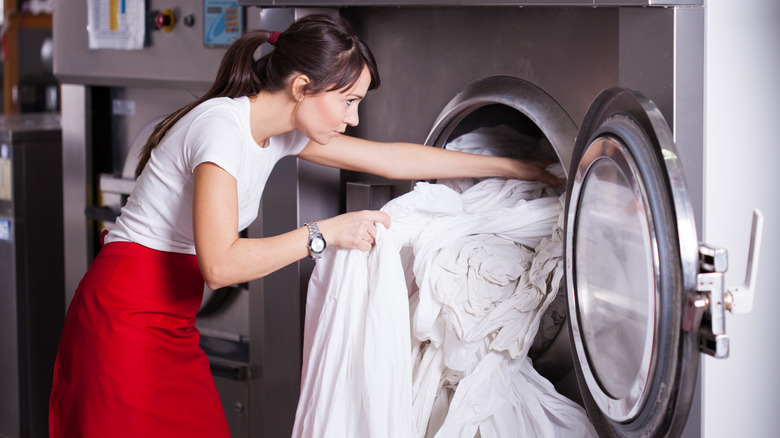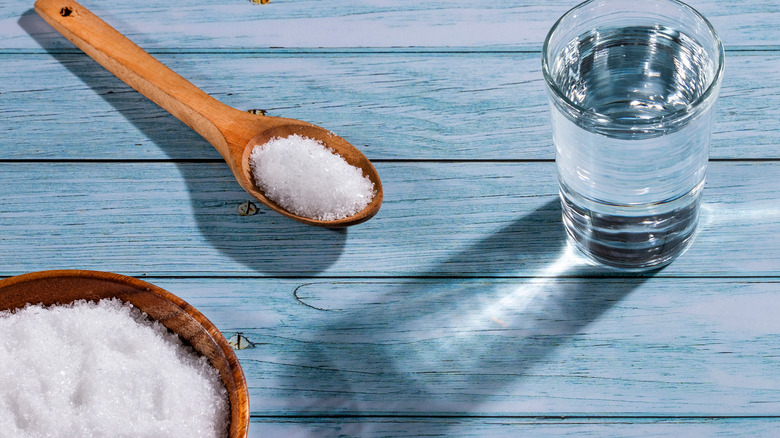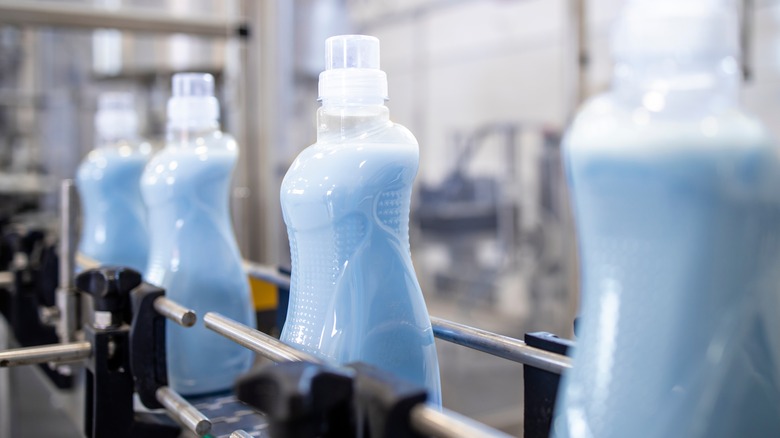The Epsom Salt Hack You Should Consider Before Washing Sheets For An Ultra-Comfy Bed
Nothing beats getting into bed with freshly washed sheets... unless, well, they're a bit on the crispy and crunchy side. This happens when sheets have mineral or chemical buildup, potentially from hard water or detergent residue. And it can be unpleasant. One way to help soften your bedding in the wash cycle is by adding Epsom salts. Epsom salt — first discovered in Epsom, England — is actually magnesium sulfate and differs greatly from regular table salt (sodium chloride). This mineral is probably most often used as a bath soak, and Epsom salt can even help out in the garden, but it's also quite effective as a fabric softener because it's a natural water softener.
This might seem counterintuitive because part of what makes water hard is the presence of magnesium, a main component of Epsom salts. But in fact, the ion exchange caused by Epsom salts actually softens the water, says Pure Water Blog. By washing your sheets with Epsom salts, you can counteract hard water, and since the salt is an abrasive, prevent product buildup. Plus, there's a myriad of bonuses to using Epsom salt: it's free of harsh synthetic chemicals and fragrances, costs relatively little when compared to store-bought fabric softeners, and is a more eco-friendly, sustainable option than disposable dryer sheets.
How to use Epsom salt to soften sheets
There are two different possible methods you can use when it comes to using Epsom salts as a fabric softener. First, if you have a top-loading washing machine, you can fill the basin with water and a generous scoop of Epsom salts. For those with front-loading machines, you can still try this in the bathtub. Allow the sheets to soak in the saline solution for at least a few hours — the longer the better. After they've absorbed the salts, add the sheets to the washer and wash them on your usual bed linen setting.
You can also just toss Epsom salts into the washing tumbler like you would a powdered detergent or baking soda. Add about 1/4 cup of salt to the washing load and make sure the water is warm enough that the salt can actually dissolve in the process, or else it can cause mineral buildup in your machine. If you find yourself missing the smell of store-bought softener, consider adding Epsom salts to a jar with a few drops of your favorite colorless essential oils. The all-natural fragrance will meld with the salts and leave a pleasant aroma on your laundry. And with this method, you can have a natural fabric softener ready to go at all times –one that just so happens to be able to double as a bath soak!
Why ditch traditional fabric softener?
Maybe you're perfectly happy using fabric softener and don't see the point in switching to Epsom salts. Your mind may change, though, when you hear that Consumer Reporters laundry expert Rich Handel isn't a fan. As he said in a Consumer Reports interview, "I'd never use fabric softener—it's a waste of money. Not only can it irritate sensitive skin, but it can also leave a layer of residue on your clothes and reduce the absorption of your towels."
Basically, Handel thinks it does its job poorly and isn't worth the downsides. To Handel's first point, big-name fabric softener brands such as Downy come down to about $.13 per fluid ounce at Walmart, whereas a bag of Dr. Teal's Pure Epsom Salts clock in at about $.06 per ounce, which may not seem like a huge difference, but certainly adds up over time. Another thing that puts Epsom salts ahead of fabric softeners is their ingredient list. Liquid fabric softeners are also loaded with water, which means you're paying for something that you can basically have for free at home. They also tend to have fillers such as stabilizing ingredients and pH adjusters. But Epsom salt is a concentrated substance, so you aren't paying for any extras.
Finally, with Epsom salts, you won't have to worry about irritated skin due to synthetic chemicals and fragrances, which is fantastic if you want to be in control of what products you and your family are using. After making the switch, you might never buy fabric softener again.



